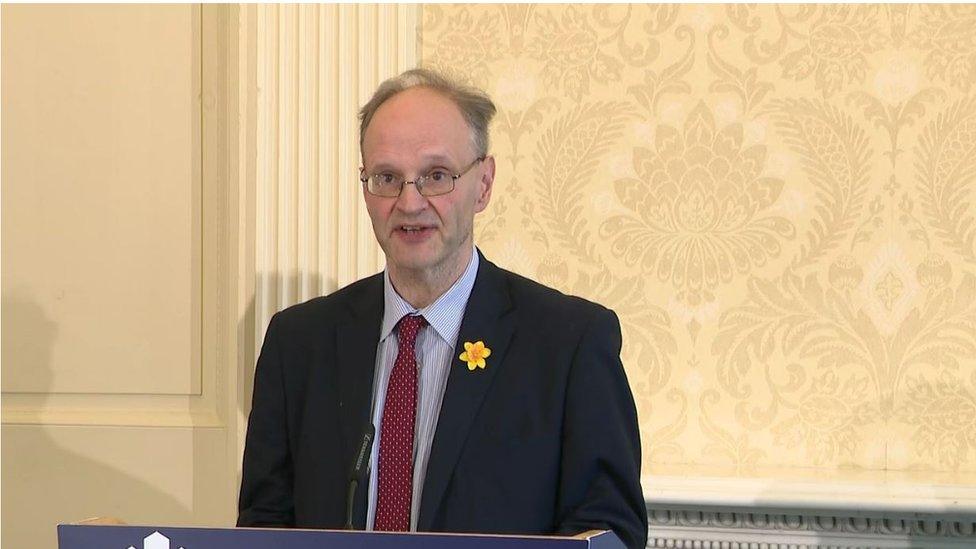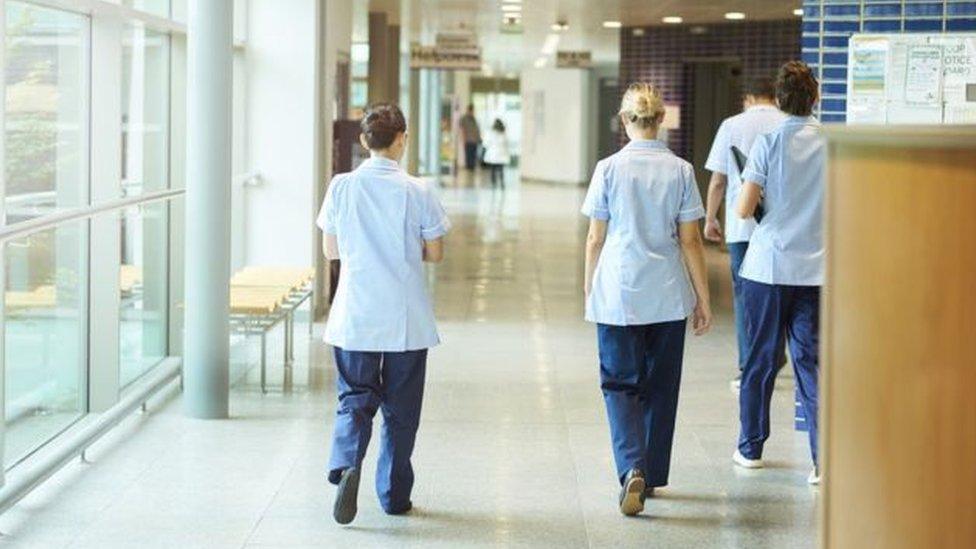Coronavirus: Minister says NI schools must cater for key workers
- Published

First Minister Arlene Foster said schools were being repurposed and "unfortunately the educational work that goes on [in schools] has come to an end".
All schools should be prepared to cater for key workers' children from Monday, Education Minister Peter Weir has said.
He said only children, up to and including year 10, whose parents provide "essential goods and services", should attend.
Schools and colleges are closing to help tackle the spread of coronavirus.
First Minister Arlene Foster said schools were being repurposed and "unfortunately the educational work that goes on has come to an end".
"They will provide online planning and resource packs," she said.
Speaking at a joint press conference with Deputy First Minister Michelle O'Neill at Stormont on Friday, Mrs Foster insisted there was no tension between them over the schools issue.
At the press conference she said "schools are closed as we know them".
Mrs Foster later told BBC Newsline that it is not known how many children will turn up to schools on Monday.
"We estimate it could be between 15% and 20%," Mrs Foster said.
"If that happens, then we will evolve the situation as to ho we deal with those children and how we make sure that they are protected in that environment, that there is social distancing practiced and that they are looked after in the appropriate way."
She said both parents do not need to be key workers to avail of this measure.
Earlier, Ms O'Neill expressed concern that Mr Weir's guidance had caused confusion.
The Department of Education is expected to issue further guidance later on Friday.
Teachers and principals have also called for clarity. Many anticipated that a skeleton network of schools would be required to stay open to accommodate the limited numbers of pupils involved, not every school in the region.

EASY STEPS: How to keep safe
A SIMPLE GUIDE: What are the symptoms?
CONTAINMENT: What it means to self-isolate
HEALTH MYTHS: The fake advice you should ignore
MAPS AND CHARTS: Visual guide to the outbreak
VIDEO: The 20-second hand wash

Mrs O'Neill said: "There has been confusion overnight in terms of the guidance that has been given out by the education minister that needs to be clarified.
"Can schools be part of a solution for helping key workers get to work to provide the frontline public services, then yes, but let's work that out, let's not confuse the picture anymore."
What is a key worker?
Mr Weir has released a letter, external outlining occupations in the "key worker" category:
Health and Social Care: Doctors, nurses, midwives, paramedics, social workers, home carers
Education and childcare: Nursery and teaching staff, social workers and specialist education professionals
Public safety and national security: Civilians and officers in the police, Fire and Rescue Service, prison service and other national security roles
Transport: Those keeping air, water, road and rail transport modes operating
Utilities and Communication: Staff needed for oil, gas, electricity and water (including sewage) and primary industry supplies; key staff in telecommunications, post and delivery, services and waste disposal
Food and other necessary goods: Those involved in food production, processing, distribution and sale, and those essential to the provision of other key goods (e.g hygiene, medical)
Other workers essential to delivering key public services
Key national and local government staff including administrative occupations
He said he was trusting parents to decide what was best for their children.
"This is only for key workers, where they cannot find an alternative," Mr Weir told BBC Radio Ulster's Good Morning Ulster.
"For a lot of key workers they will have somebody at home... to look after them."

Education Minister Peter Weir released a letter outlining occupations in the "key worker" category
He estimated "10 to 15%" of pupils would turn up at schools on Monday.
"We're told that certainly there's very little difference between having zero and 20% within the schools in terms of a safety point of view," said Mr Weir.
He accepted things would be "potentially messy... problematical" on Monday, but stressed: "We've got to do something.
"As we move ahead... we'll see adjustments to that."
Mr Weir said he wanted to keep the number of pupils coming into schools to a minimum, but added there would need to be some flexibility to ensure key workers were supported.
"It is impossible to assess at this stage what the exact demand will be in relation to the number of key worker children who will need to attend school," he added.

Health and Social Care staff feature on the list of key workers